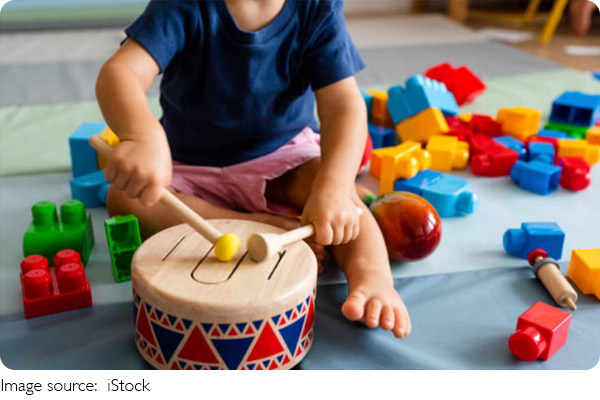Words to Teach

The first year of life is a period of rapid growth for a child, and one of the most exciting milestones is the utterance of their first words. This moment brings immense joy to families and is something to be cherished forever.
Throughout the first year, infants develop a wide range of skills and experiences that lead them to this significant achievement.
From Unintentional Sounds to First Words
Babies begin to engage in early forms of communication, even before they utter their first words. Initially, they experiment with non-intentional proto-conversations and babbling. During this stage, they strengthen the muscles necessary for speech and discover that their voice can be used to get the attention of those around them.
Over time, they move from non-intentional communication to intentional communication. Joint attention and triadic interaction skills also begin to emerge, setting the stage for meaningful conversations. By the time they say their first word, infants have accumulated a vast "mental dictionary" of sounds, ready to express their first coherent word.

The Magic Behind Language Development
The process of learning language is filled with both effort and wonder. Children’s first words are typically linked to people they are closest to, like "mama" and "papa."
These words have a strong emotional connection and are often the first to emerge in a child’s phonetic repertoire. As babies continue to explore their world, they may also use words related to their needs, such as words for "water" or "food," or they might imitate animal sounds. It's common for a single word to take on multiple meanings as children start to use it in different contexts.
What Comes After the First Word?
Once a child speaks their first word, there is much more to learn. Language acquisition continues through experiences, the models to which the child is exposed, and play. Adults play a vital role in fostering language development. Although language skills are innate, providing the right stimulation ensures a healthy and balanced growth that positively impacts self-esteem, well-being, cognitive development, and learning abilities.
Key Words for Communication
The words that children learn are those to which they are most frequently exposed in their environment. The most essential words are functional and social words—words that help children express their needs, desires, and establish connections with others. The first words that a child typically learns include:

Names of Loved Ones
Names of familiar people, like parents, grandparents, and relatives, are often among the first words a child will say. To encourage the learning of these words, engage with the child by bringing them close to the person and using positive reinforcement, such as showing excitement when someone appears after being called. Games like peek-a-boo can also be helpful in teaching the names of familiar faces.
Names of Foods and Everyday Objects
Words related to food and everyday objects are crucial as they enable a child to express their needs. Always label what you are offering the child, such as saying "water" when giving them a drink. If the child gestures for something, reinforce it with words: "water, yes, you want water!" This repetition helps the child associate words with actions.
Names of Animals
Animals are another area where children typically start to learn words. When teaching animal names, it’s important to avoid imprecise words like "woof" for a dog. Instead, say, "This is a dog, wow, the dog says woof!" This helps the child understand that the correct word is "dog," not the sound it makes.
Objects of Daily Use
Items commonly found around the house, such as cups, utensils, toothbrushes, towels, favorite toys, and clothing, are also important words to teach. Describe everyday activities clearly and simply, focusing on the child’s interests and surroundings.
Words to Delay
Certain words, like numbers, letters, and colors, are not as essential for young children to learn early on, as they do not directly help with communication or interaction. These words can be introduced at a later stage when the child is ready.

Conclusion
The early stages of language development are full of excitement and significance. By providing the right environment and support, adults can help children develop strong communication skills that will benefit them throughout their lives. Understanding the right words to focus on and how to support language learning is key to a child's growth.
-
 Lip Liner Trick!No Lip Liner Yet?! Could This One Step Be The Secret To Fuller, Juicier Lips?! Let's See!
Lip Liner Trick!No Lip Liner Yet?! Could This One Step Be The Secret To Fuller, Juicier Lips?! Let's See! -
 Yoga Brings BalanceWe Tried Daily Yoga for a Month — The Results on Our Body and Mind Were Way Beyond Expectations!
Yoga Brings BalanceWe Tried Daily Yoga for a Month — The Results on Our Body and Mind Were Way Beyond Expectations! -
 Fig Sandwich MagicHave You Ever Tasted This Sweet and Savory Fig Sandwich? One Bite Might Change Your Breakfast Forever!
Fig Sandwich MagicHave You Ever Tasted This Sweet and Savory Fig Sandwich? One Bite Might Change Your Breakfast Forever!